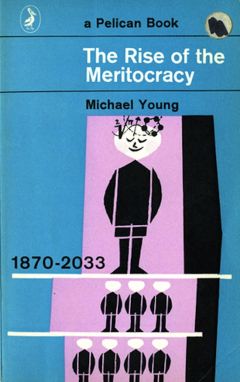Michael Young's classic attack on the arrogance and thoughtlessness of our meritocracy and failure to understand the breadth and diversity of human values.
Author: Michael Young
Michael Young's classic satire on the development of the meritocracy - rule by an elite who have determined exactly the educational qualities necessary to promote economic growth and who are then selected and rewarded for those special skills - is even more relevant today than ever.

The book was written in 1958, and it offers the perspective of a successful meritocrat looking backward from 2033 to the Twentieth Century and remembering the steps by which meritocracy was achieved:
Today we frankly recognize that democracy can be no more than an aspiration, and have rule not so much by the people as by the cleverest people; not an aristocracy of birth, not a plutocracy of wealth, but a true meritocracy of talent.
Today 2033 is not far away and the meritocracy that Young described seems more real than ever:
Of course there were some things he got wrong. The very economic growth that justified meritocratic power has been harder to achieve than the book imagined; and if we have learnt anything since 1958 it's that economic success has got very little to do with clever people in Whitehall. But to a very large extent it's hard to see much difference between our current reality and his dystopia.
One of the most poignant parts of the book is where Young imagines a revolutionary movement publishing the Chelsea Manifesto, which beautifully expresses a better vision for society:
The classless society would be one which both possessed and acted upon plural values. Were we to evaluate people, not only according to their intelligence and their education, their occupation and their power, but according to the kindliness and their courage, their imagination and their sensitivity, their sympathy and generosity, there could be no classes. Who would be able to say the scientist was superior to the porter with admirable qualities as a father, the civil servant with unusual skill at gaining prizes to the lorry driver with unusual skill at growing roses? The classless society would also be the tolerant society, in which individual differences were actively encouraged as we all passively tolerated, in which full meaning was at last given to the dignity of man. Every human being would then have equal opportunity, not to rise up in the world in the light of any mathematical measure, but to develop his own special capacities for leading a rich life.
Today the term 'meritocracy' is used positively and thoughtlessly as a kind of sub-standard proxy for fairness - acceptable to both Left and Right. Moreover we are now ruled by an elite who have all largely attended the same schools, the same universities and are all part of the same clubs. They compete with each other to 'rise to power' and perhaps inevitably they believe that they must somehow deserve both power and the rewards of power. Party politics seems to offer no hope of challenging the meritocracy.
In Michael Young's satire meritocracy ends in bloody revolution; he imagine individuals and families rising up against the social engineering of the elite. Hopefully we will avoid violence. Instead it may be necessary for those of us outside the elite to begin by taking back control over our own lives, our family lives and our communities. While we would certainly benefit from fairer laws and better systems we may have to start by changing ourselves - by behaving like the citizens that we need and ought to be.
The publisher is Pelican.
The Rise of the Meritocracy © Michael Young
Review of The Rise of the Meritocracy © Simon Duffy 2011.
All Rights Reserved. No part of this paper may be reproduced in any form without permission from the publisher except for the quotation of brief passages in reviews.
faith & creativity, politics, social justice, Reviews